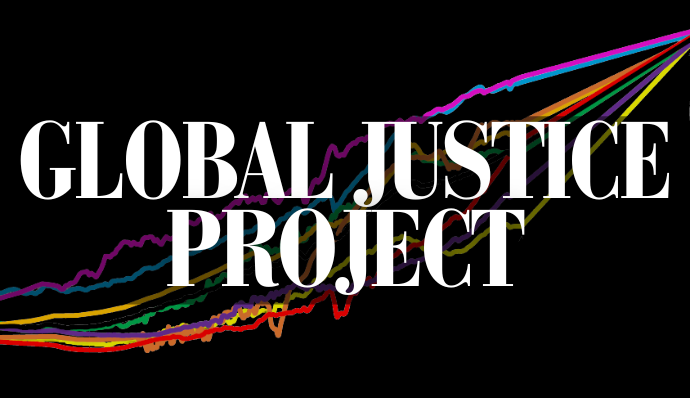What is the Global Justice Project?

The Global Justice Project (GJP) is a collective research initiative developed by the World Inequality Lab.
Combining comparative historical data series from the World Inequality Database with global input-output tables, environmental accounts, labour force surveys and other sources, the project explores what a just distribution of socio-economic and environmental resources could look like at the global level from 2025 to 2100 – both between and within countries – in a way that is compatible with planetary boundaries.
The project partly builds on the analysis and proposals set out in Thomas Piketty’s Brief History of Equality, extending them into a broader and more comprehensive global framework.
What are the goals?
The centrepiece of the GJP will be “global convergence” scenarios that combine two key goals:
1. Socio-economic equality: Full economic convergence between countries, full gender equality in labour hours and pay, sharp compression of within country income scale and wealth scale, combined with fair access to education, healthcare and effective participation in all aspects of social, economic, cultural and political life.
2. Planetary habitability: Aligning global resource use within ecological boundaries, accounting for carbon budgets, raw material constraints and the preservation of biodiversity.
How to achieve these goals?
The GJP envisages a radical transformation of the global production system and international economic arrangements over the 21st century. This would entail not only a re-structuring of the sectoral and gender composition of labour time and rapid reduction of carbon, material intensities of production, but also a strong shift towards more equal terms of international trade and monetary exchange.
To support critical investments in human capital as well as climate mitigation and adaptation, particularly in the Global South, the GJP proposes a Global Justice Fund, to be financed by the global rich and through a radical transformation of the international financial and monetary regime.
Who is involved?
The project is coordinated by Lucas Chancel, Cornelia Mohren, Rowaida Moshrif, Moritz Odersky, Thomas Piketty, and Anmol Somanchi.
Other participants to the project include:
Raavi Aggarwal, Marie Andreescu, Manuel Esteban Arias-Osorio, Oscar Barrera, Luis Bauluz, Thomas Bézy, Nitin Kumar Bharti, Philipp Bothe, Pierre Brassac, Julia Cagé, Jonas Dietrich, Dima El Hariri, Alice Fauvel, Ignacio Flores, Valentina Gabrielli, Amory Gethin, Ricardo Gómez-Carrera, Sehyun Hong, Thanasak Jenmana, Romaine Loubes, Clara Martínez-Toledano, Zhexun Mo, Stella Muti, Theresa Neef, Gastón Nievas, Anne-Sophie Robilliard, Emmanuel Saez, Alice Sodano, Li Yang, Gabriel Zucman, Álvaro Zuñiga-Cordero.
Timeline
- December 2024 to May 2026: Publication, circulation and revision of GJP research papers and technical notes
- Thursday 4, Friday 5 and Saturday 6 June 2026: Launch of the Global Justice Report: A Plan for Equality & Prosperity within Planetary Boundaries in 2100 at the World Inequality Conference, Paris School of Economics
GJP Research Papers
“Global Labour Hours in Paid and Unpaid Work: Productivity and Structural Transformation, 1800-2100”, Marie Andreescu, Romaine Loubes, Thomas Piketty, Anne-Sophie Robilliard, WIL WP 2025/08 (May 2025) (Replication Package)
“Unequal Exchange and North-South Relations: Evidence from Global Trade Flows and the World Balance of Payments 1800-2025”, Gastón Nievas, Thomas Piketty, WIL WP 2025/11 (June 2025) (Replication Package) (World Historical Balance of Payments Database)
“Human Capital, Unequal Opportunities and Productivity Convergence: A Global Historical Perspective, 1800-2100“, Nitin Kumar Bharti, Amory Gethin, Thanasak Jenmana, Zhexun Mo, Thomas Piketty, Li Yang , WIL WP 2025/15 (July 2025) (Replication Package) (World Human Capital Expenditure Database)
“Global Wealth Accumulation and Ownership Patterns, 1800-2025”, Luis Bauluz, Pierre Brassac, Jonas Dietrich, Clara Martínez-Toledano, Gastón Nievas, Moritz Odersky, Thomas Piketty, Alice Sodano, Anmol Somanchi, WIL WP 2025/22 (September 2025) (Replication Package)
“Equality and Development: A Comparative & Historical Perspective 1800-2025”, Marie Andreescu, Manuel Arias-Osorio, Luis Bauluz, Nitin Bharti, Philipp Bothe, Pierre Brassac, Lucas Chancel, Mauricio De Rosa, Jonas Dietrich, Dima El Hariri, Matthew Fisher-Post, Ignacio Flores, Valentina Gabrielli, Amory Gethin, Ricardo Gómez-Carrera, Sehyun Hong, Thanasak Jenmana, Romaine Loubes, Clara Martínez-Toledano, Zhexun Mo, Cornelia Mohren, Marc Morgan, Rowaida Moshrif, Stella Muti, Theresa Neef, Gastón Nievas, Moritz Odersky, Thomas Piketty, Anne-Sophie Robilliard, Emmanuel Saez, Alice Sodano, Anmol Somanchi, Li Yang, Gabriel Zucman, Álvaro Zuñiga-Cordero, WIL WP 2025/25 (October 2025) (Replication Package)
“Planetary Habitability, Global Convergence and Structural Transformation, 2030-2100”, Lucas Chancel, Cornelia Mohren, Moritz Odersky, Thomas Piketty, Anmol Somanchi (in-progress; target publication date: February 2026)
“Global Justice: Distributional Pathways, Central Scenario & Variants 2030-2100” (Philipp Bothe, Lucas Chancel, Jonas Dietrich, Cornelia Mohren, Moritz Odersky, Thomas Piketty, Anmol Somanchi ) (in-progress; target publication date: March 2026)
GJP Technical Notes
“Extending WID Population Series: Projections 2024-2100 and Age/Gender Breakdowns”, Ricardo Gómez-Carrera, Rowaida Moshrif, Gastón Nievas, Anmol Somanchi (WIL TN 2024/12) (December 2024) (Replication Package)
“WID National Accounts Series: Updated and Extended Coverage 1800-2023”, Gastón Nievas, Thomas Piketty (WIL TN 2025/02) (May 2025) (Replication Package)
“Extending WID National Accounts Series: Institutional Sectors and Factor Shares”, Jonas Dietrich, Gastón Nievas, Moritz Odersky, Thomas Piketty, Anmol Somanchi (WIL TN 2025/03) (June 2025) (Replication Package)
How to Contribute?
- To stay updated on new publications, events, and upcoming releases, join the mailing list.
- For research collaborations, feedback or academic enquiries, contact:
Anmol Somanchi, GJP Coordinator/Lead Author – anmol.smnch[at]protonmail.com - For press or policy-related questions, contact:
Alice Fauvel, WIL Communication Manager – alice.fauvel[at]psemail.eu

